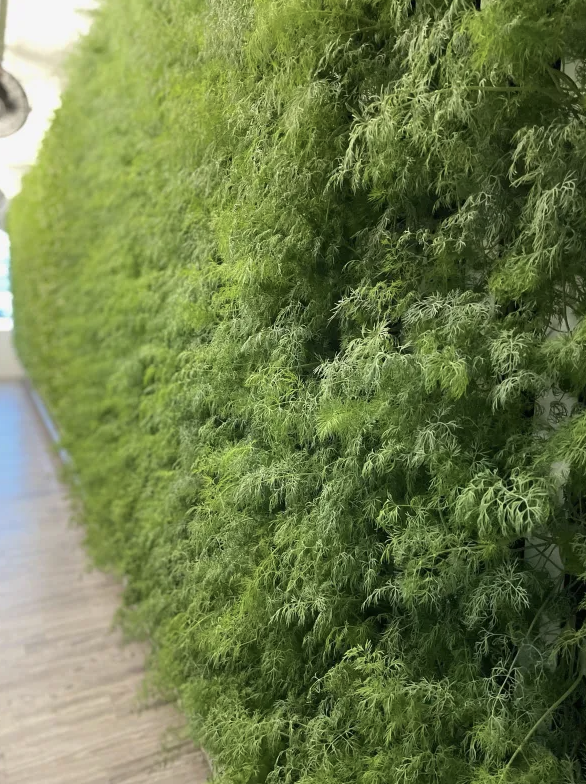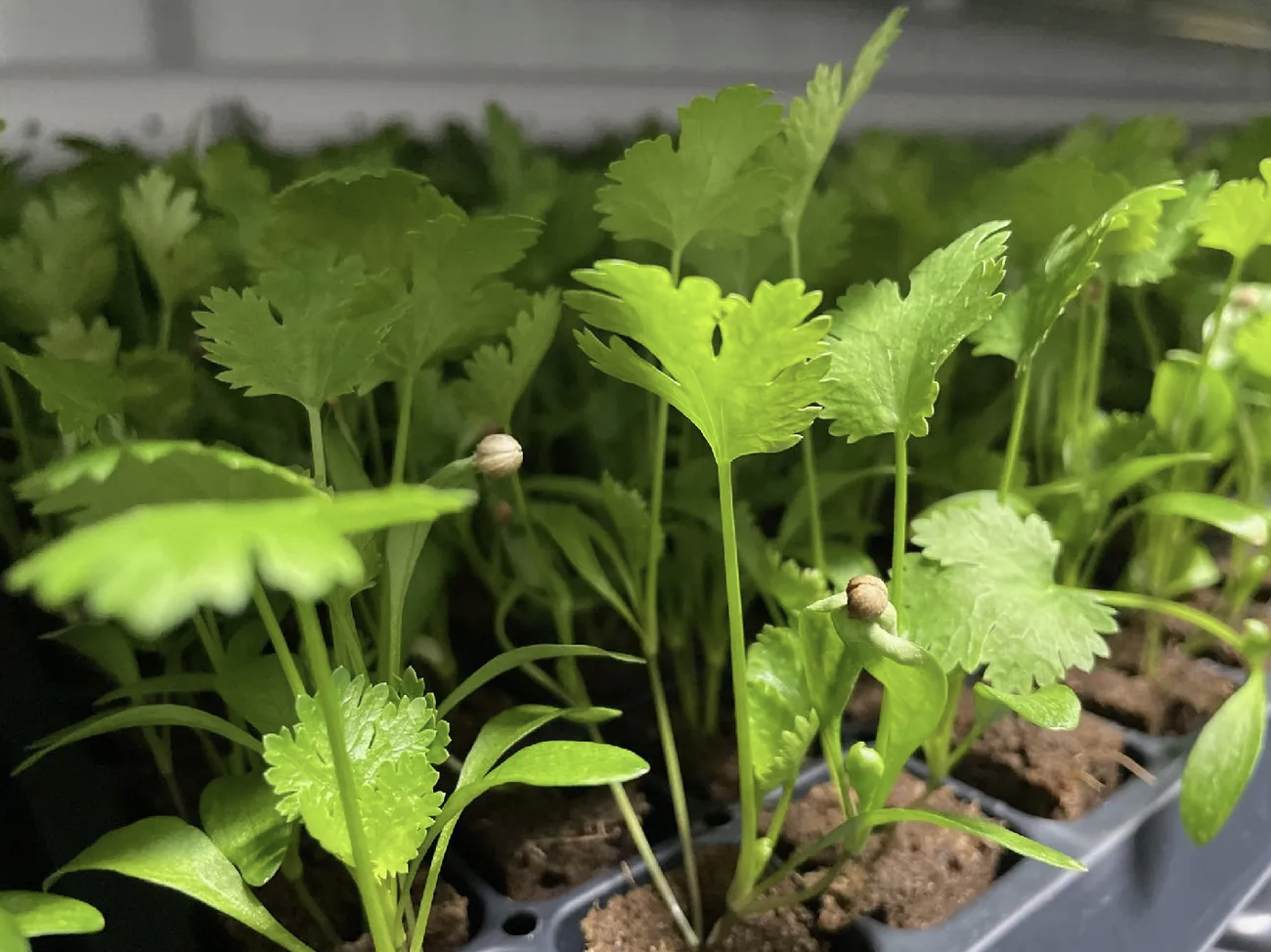In A Farm Made Up of 20 Shipping Containers, 2.4 million Containers of Greens Grow Each Year
Kristine M. Kierzek
May 3, 2023
Special to the Milwaukee Journal Sentinel
Food and where it comes from has always been a life thread for Hank Kim.
Back in his homeland of South Korea, Kim’s grandfather was a farmer.
Kim followed his brother to the United States for college. As a student, he started creating gardens, with a focus on edible gardens. During his time at Johnson & Wales University, he helped create a hydroponic garden and experimented with growing different foods. He moved to Milwaukee in 2018, and while working as the general manager at Char’d, he continued to experiment with hydroponics.
What we eat and how it gets to our table, it matters to him.
In March 2022, Kim became operations manager at Square Roots, 10915 38th St. in Kenosha. The young and growing farm operation founded by entrepreneurs Tobias Peggs and Kimbal Musk (brother of Elon Musk), builds vertical, climate-controlled and hydroponic farm systems within shipping containers. These can be up and running within three months, operate 365 days a year, and can be built just about anywhere there is an available source of power, wi-fi and water. The Kenosha facility and its closed water system produces upwards of 2.4 million containers of greens each year.
Opened in 2022, the Kenosha location sits within 20 shipping containers adjacent to partner Gordon Foods’ distribution center. It is near the highway and multiple other distribution centers close to the Illinois border, including Amazon and Meijer. Currently, Square Roots is headquartered in Brooklyn. Additional farm locations are in Grand Rapids, Mich., Springfield, Ohio, and the newest farm in Shepherdsville, Ken., which will have its first harvest this month.
Square Roots greens and herbs are sold in 55 Wisconsin stores, including Milwaukee’s Outpost Natural Foods locations at 100 E. Capitol Drive and 2826 S. Kinnickinnic Ave., and in Kenosha at Stinebrinks Piggly Wiggly, 7600 Pershing Blvd. and 2801 14th Place, #1, and Meijer, 7701 Green Bay Road, Kenosha.
Kim, who recently moved from Milwaukee to northern Illinois, speaks English, Korean and Mandarin. He talked with us about the farm and what he sees for the future of food.
His farming roots followed him across the globe
I was running a community garden in Miami, an outdoor lot that we were able to borrow from an apartment landlord. … I met a bunch of young folks who were marching against GMOs. Instead of protesting, we were wondering what we could do. We wanted to grow our own food and raise awareness that you can grow your own food without buying GMO. My grandfather was a farmer in South Korea.
Behind the business of food
Before we talk about Square Roots, I want to share the challenges of the current food system, caused by efficiency and unsustainability. About 70% of food contains pesticides, and about 40% of the food grown is wasted. … On top of that, most of the food we eat is shipped across the globe. People don't know where their food comes from. They’ve lost connection with their food. Quite a lot of people don't trust their food. … We’ve already seen the demand for organic food skyrocket. We believe next is the demand for local food. …
We need urban farming to scale fast. How we’re doing it is by building farms, these are indoor controlled climate farms built inside shipping containers. We can pop up on an underutilized parking lot, or right on the food distribution center, like GFS distribution center's parking lot (in Kenosha). There are many advantages to using shipping containers for the vertical farms. The first thing is modularity. Shipping containers are easy to install, quick to install, and each container has its own climate. That means we can grow a diverse range of crops using a small footprint.
How they select locations
The distribution hubs, that is the main reason we chose Kenosha. We signed an agreement with our strategic partner, GFS, to reduce the footprint of our crops traveling. Instead of shipping across the country, we’re trying to partner with food distributors to service the local areas. … We also recently signed a new partnership with UNFI, the biggest distributor for Whole Foods. So we are anticipating to build more of our facilities in relation to UNFI. Gordon Food Service is mostly a restaurant food service.
The future of farming
Our farm looks very different than traditional farms. Unlike traditional farms with crops affected by outdoor climate, including extreme weather conditions, drought, hurricanes, we are able to grow the crops in optimal conditions 365 days because they are secured in shipping containers.
Daily data collection transformed with technology
Every day is a new learning day. I think that is why collecting the data is important. For example, just a year ago, with the system we started, we had to learn that basil needs to be at a warmer temperature than other cold herbs, even for storing. so we built two different coolers with two different temperatures.
What they grow
Four different herbs and four different salad mixes. We have basil, parsley, cilantro and dill for the herbs. We also offer spring mix, super mix, crispy leaf mix and arugula mix for salads.
Greens are just the starting point
We can grow a wide range of produce in our containers. We’ve tried greens, herbs, strawberries, and tomatoes. What we choose to grow is guided by a variety of factors including economic viability and demand. … We are constantly experimenting with new crops. I think compared to tomatoes, they take more biomass, and we can only sell the fruit. All the stems and leaf they don't get priced in. That is why we specialize in greens first because except for the roots, everything gets sold.
Hydroponics hobby at home
I’m actually experimenting with growing strawberries in my home hydroponically. I just started that.
I started hydroponics in college, as part of the edible garden club. I took care of all the fruit trees and vegetables on campus. We had some budget from the college (Johnson & Wales in Florida) and wanted to showcase new technology. … We had starfruit trees, and cacao. We were able to show off cool fruit trees outside and also, we’re growing inside too.
What he wants you to know
Hydroponic by definition is simply growing without soil, directly in the water pretty much. This means the crop can grow where no soil exists or soil is contaminated. It is pesticide free as well. At least at Square Roots, the farming method is a significant factor to our ability to bring real food year-round.
The road less traveled
Because of being on a food distribution center, our crops don't have to travel hundreds of miles just to get to the distribution center and the end customers. With us harvesting every day, from harvest to the store shelf takes 24 to 48 hours.
Does he ever get sick of salad?
I eat at least a salad per day. I like the spring mix personally, I like that it is a bit of a variety mix. Supermix, or crispy leaf mix or arugula are very specialized, there is one type of base, whereas spring mix has a little different types of lettuce in there. I also think it is a little softer for texture.
Technically I have two salads per day. I always make green juice with our salad mix and fruits. That's my breakfast every day.
Track your salad
On the back of each package we have a QR code. We call it a transparency timeline. Anyone can use their phone to scan the QR code to see what day the crop was seeded, transplanted, harvested and when it was delivered.
How much of this is technology reliant?
We do have a backup generator. Once we lose electricity completely, we would not be operating. The biggest resource we heavily rely on is power, so electricity, water, and the internet. … We can deploy our farm anywhere, as long as they have internet, power, and water, even Antarctica or a cruise ship.
Traditional versus technology and farming
We do have farmers from soil farms (working with us), and I do think their knowledge helps. It is not completely different. … I would say this is the new way, or the future, but I also don't want to disrespect any of the soil farmers.
Why this appeals to him
The appeal is to be able to grow delicious food 365 days knowing that we don’t use any pesticides. We have very strict food safety policies, we make sure we are sanitizing the goods we are bringing in, gowning up and not introducing any bugs from outside. The plants can't get any cleaner. The leaves don’t even touch the water, it only touches roots. … I think everyone wants access to food without pesticides and non-GMO, freshly harvested within a day or two.
More: Supermoon Beer Co. owner creates farmhouse style, barrel-aged beer at Bay View brewery
Fork. Spoon. Life. explores the everyday relationship that local notables (within the food community and without) have with food. To suggest future personalities to profile, email psullivan@gannett.com.








